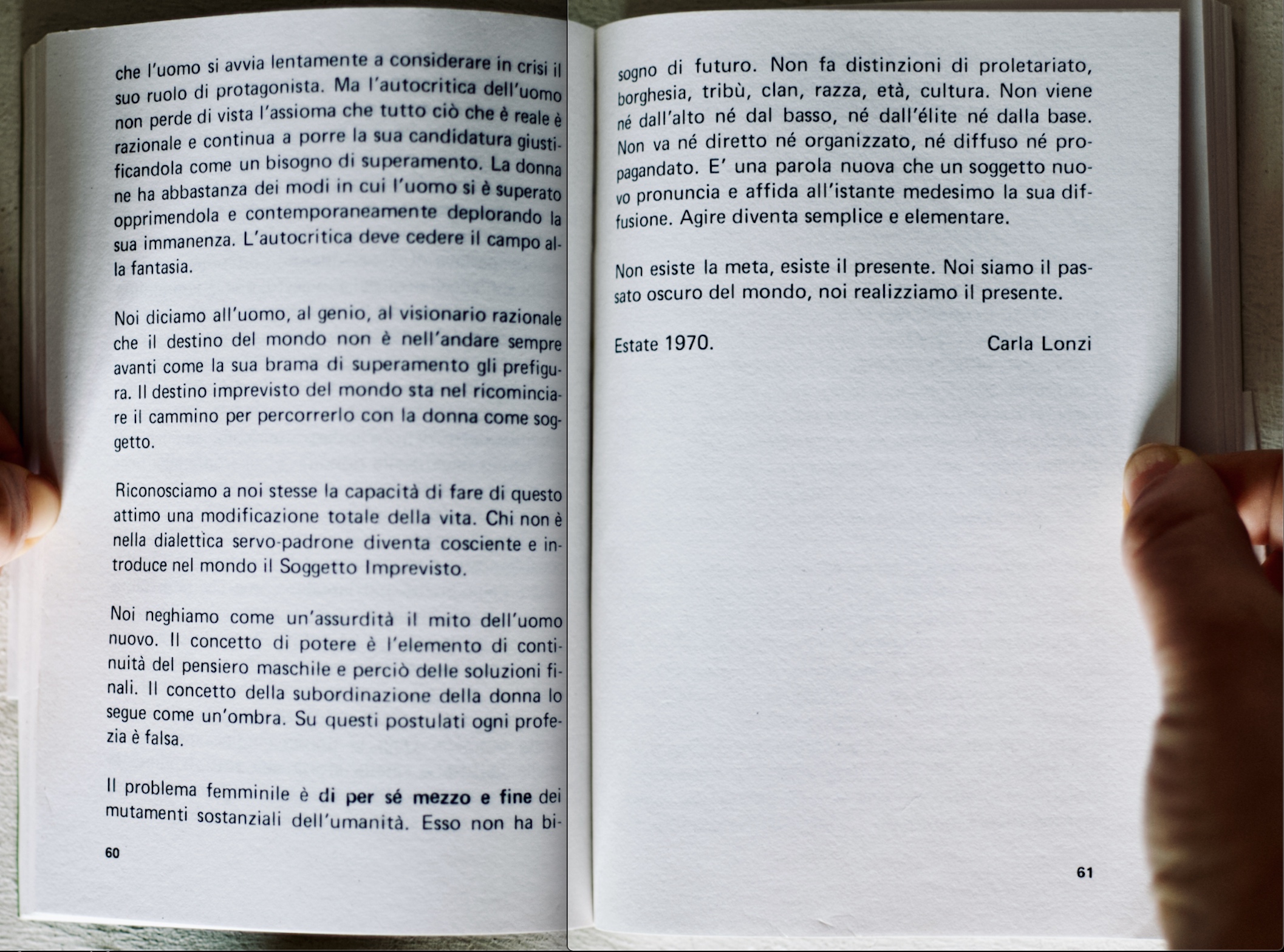
Writing a short piece for this project had been on my list for a couple of weeks, perhaps even months. Now, during this weird time of quarantines and shutdowns, in which an unfair and gendered distribution of essential and care work once again comes to the attention of the general public, I’m revisiting my notes on a text by Carla Lonzi, a text that has spoken to me and that has been discussed within the rooms of diffrakt multiple times. The text, or, more accurately, the pamphlet called Sputiamo su Hegel, We/Let’s Spit on Hegel, is mainly a polemical critique of the history of western philosophy (epitomised by Hegel) and of the notion of equality or the demand for it without the overthrow of an established system. The more I read it, however, the more resonances I find. This might not only be to do with the content, there are in fact bits and pieces where I find Lonzi’s statements incorrect – but then again, a certain tolerance to error might be advisable to later readers anyway; it might be more to do with the style, full of (heroic?) pathos and hope, almost a manifesto. Not only does this draw me in personally, I also believe that it is something that might help us build important alliances and bridges, such as a much-needed bridge between second-wave feminism and intersectional feminism; but one could also think of the ongoing drifting-apart of academic philosophy and current affairs…
If, in contrast, we are to create better feminist futures, we really do need to build stronger bridges between the generations, we need better relationships to those who came before us and those who will come after. So here are my three take-away notes from rereading this text, once again, even if none of them may sound like a great revelation:
Firstly, to demand inclusion or equality without challenging the established systems is almost always a huge mistake. Secondly, while it is necessary to rebuild and challenge the system as a whole, we also need a different subject whose creation is based upon the assertion of difference (which requires work). I might be remodelling Lonzi here, but many of her conversations and discussions within the collective Rivolta Femminile and her use of the expression “fare il femminismo” do point towards the fact that both doing and making (fare in Italian) must beware of failing to consider the undoing of the myths that maintain predominant culture. To think, here, of the undoing of gender, the deconstruction of binary oppositions, without abolishing differences, opening up, instead, the possibilities of alliances for non-conforming identities, might not be entirely absurd. Thirdly, and finally: The time is always the present. It is this notion of time that becomes apparent at the end of Lonzi’s text, an ending both enigmatic and captivating:

“Our message to man, to the genius, to the rational visionary is this: the future of the world does not lie in moving continually forwards along a path mapped out by man’s desire for overcoming difficulties. The future of the world is open: it lies in starting along the path from the beginning again […].
We recognize within ourselves the capacity for effecting a complete transformation of life. Not being trapped within the master-slave dialectic, we become conscious of ourselves; we are the Unexpected Subject.
The feminist movement is itself the means and the end of any basic transformation of humankind. It needs no future, it makes no distinctions […]. An entirely new word is being put forward by an entirely new subject. It only has to be uttered to be heard. Acting becomes simple and elementary.
There are no goals, there is the present of our here and now. We are the world’s dark past, we we are giving shape to the present.”What stays with me is Lonzi’s description of a sudden emergence of an “Unexpected Subject” (Soggetto Imprevisto), a subject that requires neither past nor future. Today, not only during this viral crisis but in very different contexts, we hear that we lack a perspective on the future. We lack trust in the individual neoliberal promises for our futures, promises of a career (academic or otherwise), more money and so on. At the same time, we seem to lack trust in new forms of leftist collective envisionings, of new utopias. Either way, our idea of the future seems still very much connected to the idea of a linear progress and progressing. Let’s start changing it.
Hannah Wallenfels
